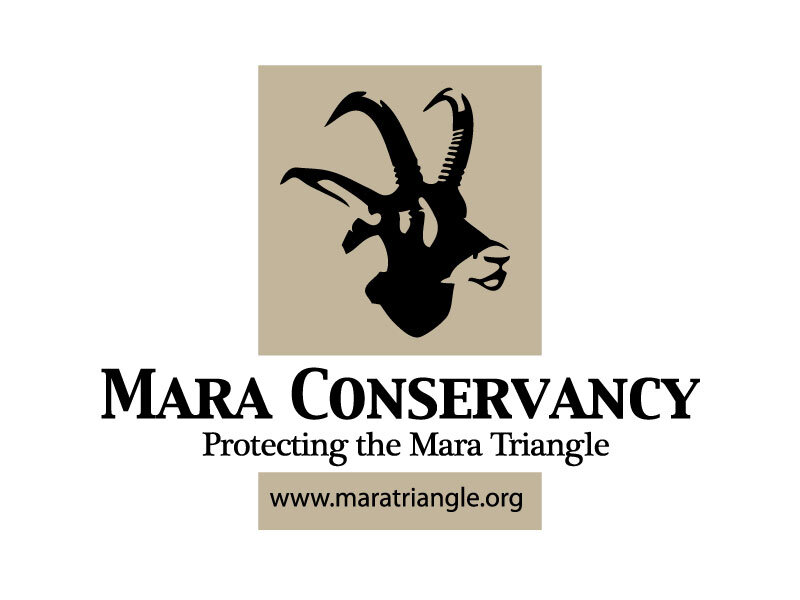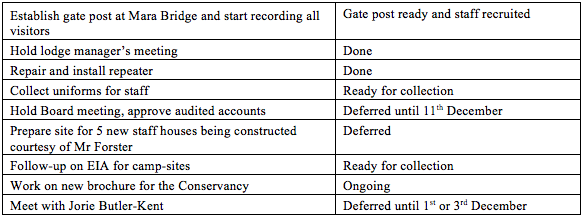General
Most of the month was uncharacteristically dry and the short rains only started in the last week of the month, with one or two heavy though isolated storms.
On the 11th there was a Director’s meeting at the KWS boardroom in Nairobi. A number of issues were discussed that will radically alter the way the Mara Conservancy conducts it’s business in future.
On the 11th the Chairman, Chief Executive and Mr S Tunai met with the MP, it was resolved that we would undertake to hold monthly meetings with the MP to brief him on progress in the Conservancy.
The Chief Executive wrote and submitted brief proposals to The Frankfurt Zoological Society and FOC, requesting funding for additional security and the community scouts.
The Chief Executive met with the Clerk, Treasurer, past and present chairmen of the finance committee from the County Council of Trans Mara. A number of issues were discussed, including revenue distribution and the fact the County Council is having problems with paying salaries on time. It is hoped that this meeting has led to a clearer understanding by the Council of the considerable reduction in revenue caused by the drop in tourism. The group also visited the developments at Mara Bridge and were most complimentary.
The District Commissioner Kisii, Mr A Lelon visited the Triangle on the 21st with his family. The District Commissioner Trans Mara, Mr Mathenge, also visited the Triangle on a private visit on the 23rd, he held brief discussions with the Chief Executive on tidying up the debris from buildings demolished at Oloololo.
On the 24th we held a lodge manager’s meeting at Little Governor’s Camp.
The maps of the Mara Triangle are almost ready, we have ordered 5,000 copies and they will retail at £ 5 or US$ 8.50 each; twice the cost of production. We are most grateful to Mr David Watson for his time in producing these maps and to Jacana for printing them in South Africa and offering 50% discount.
Wildlife
The migration returned to the Triangle in force during November and we have had very large concentrations of zebra and wildebeest throughout the central and northern two thirds of the Triangle right through the month. The zebra have been dropping foals and there are hundreds of new young everywhere. At present there is no indication that the animals are about to move.
Several prides of lion were seen throughout the month, the Musiara pride – 26 lions – crossed over to the Kichwa plains for several days before returning across the river. Another pride of 12 lions moved into the Mara Bridge area for a few days before returning across the river.
Cheetah all but disappeared with the influx of lions. However, the BBC cheetah (ear tag No 151) has returned to the Triangle from the Narok side of the river without her two cubs. The cheetah with three cubs was seen infrequently throughout the month, as were single males. One female was reported with four very small cubs by one of our patrols near Daraja Mbili in Tanzania.
The Chief Executive had a good look at the resident female rhino and she appears to be heavily pregnant. We can expect a calf sometime between December and April. The male continues to be seen occasionally. The female reportedly killed a zebra on the 27th, she had been in a stand-off with lion for some time before killing the zebra. This is not the first time; she has killed a lioness and zebra in the past.
Tourism
Most of the camps and lodges in the Triangle have done better than anticipated for November and all the indications are that we will end up with as many, if not more, visitors than November last year. The fact that the migration has concentrated in the Triangle, coupled with the good weather, meant that there were a considerable number of very late bookings, with two large incentive groups arriving in the last week of the month. Interestingly, groups that arrive in November are not as interested in the river crossings as people who visit in August to October. There were a number of spectacular crossings without a tourist vehicle in sight. We hope that we can capitalise on the migration remaining and pick up more tourists.
The fact that America has not lifted their travel advisories to Kenya will mean the Kenya does not feature in many brochures for the 2004/5 season. We can expect the downturn in tourism to continue throughout next year unless we seek new markets.
Security
Unfortunately the influx of animals from Tanzania led to a corresponding influx of poachers from Masanga and Kangriani, close to the border along the escarpment in Tanzania. We arrested 22 in the last half of the month. This brings the total arrests to 263 in two and a half years. Well over 100 wire snares were also recovered.
On the 13th some major poacher camps were found in the Ngiro-are swamp, on the Tanzanian side of the border by the rangers from Kinyangaga. A combined operation was mounted but no poachers were arrested. An unknown of animals had been killed and over 50 wire snares were recovered.
On the 15th a routine patrol by the Tanzanians from Kokatende saw some poachers along the river downstream from Mara Bridge. They sought reinforcements from us, and the combined team managed to catch one Kuria poacher.
The following day a joint patrol with the Tanzanians had more success and arrested four poachers downstream from Kokatende.
On Saturday the 22nd two of our rangers joined forces with Tanzanian rangers from Kinyangaga for a two day patrol. They arrested three poachers on Saturday and one more on Sunday near Na Mailumbua in Tanzania.
On the 22nd the Senior Warden was reported missing during a routine patrol along the Tanzanian border in an area known as Konyoike. A major search was conducted but he came out near Mara Bridge, about 30 kilometres from the vehicle he left, late in the evening.
On Sunday the 23rd our patrol from Serena returned to the Salt-lick (Ol Are) after we received a tip-off – they had patrolled there on Friday the 21st . The patrol found two large camps situated right in the swamp and we managed to arrest 13 wa Kuria poachers; the most we have arrested in a single operation. The poachers were in two groups, the first had arrived on Friday night and the second had arrived on Saturday. They had killed seven wildebeest and six zebra and were in the process of butchering them when our patrol arrived. We collected 53 wire snares, 10 spears, several knives and bows with poisoned arrows. Ten of the poachers were arrested fairly easily, the last three were only apprehended after our rangers had burnt part of the swamp, an area of about 50 x 20 meters. They had buried themselves in the mud and waited while the fire burnt over them, one of the poachers was fairly extensively burnt but the other two were unscathed. Three of the poachers in this group had been arrested previously – one of them, a Pastor, had his fine paid by a Councillor from Trans Mara. We subsequently heard from an informant that another five poachers had remained hidden in the swamp, three had been badly burnt and were later hospitalised – they waited until nightfall and escaped – a fourth was attacked and badly injured by a buffalo on his way home. The poachers were each sentenced to three years imprisonment.
On the 24th a routine patrol along the Tanzanian border between Konyoike and the Ngiro-are swamp recovered 19 wire snares – they had been in place several days and possibly the poachers had been frightened off by the search for the Senior Warden.
On the 25th another routine patrol came across signs of poaching downstream from Ol Are, three zebra and one wildebeest had been killed. Unfortunately the poachers had moved out the previous night.
Staff
The District Security Committee have commended the work done by the Mara Conservancy in anti-poaching but deferred a decision to register our security staff as Kenya Police Reservists.
Mr Abdi Boru has taken his annual leave, to be at home for the holy month of Ramadhan and is due to return on the 1st December. D Sikawa will take 20 days off in December..
Mr E Nkoitoi has taken ten days off. He will be transferred to Ngiro-are in order to free up housing for Mr Boru.
The Chief Executive took seven days off during November and will try and take more time off in December.
We have agreed with the Clerk that interviews will be conducted on the 15th December for ten additional rangers. Our ability to recruit these rangers will be subject to raising additional funds.
Development
The repeater was repaired and is functioning well.
The grader did some work on short roads to the Mara River but remained idle for most of the month. The major roads are in excellent condition and we are well prepared for the short rains, with the exception of some black cotton soil sections on the road to Oloololo gate.
The guard post and barrier at Mara Bridge is complete and will be operational in December. We interviewed some of our labourers and they will be promoted to gate attendants once they have received some training and their uniforms.
The painter is painting the inside of some of the houses at Oloololo.
We have started digging two pit latrines for visitors at Mara Bridge – these are considered a temporary measure, until we can generate sufficient funding to move the whole security compound and build proper toilet facilities.
Revenue and Accounts
October revenue was down 23% on last year but up on October 2001, the month after terrorist attacks on the World Trade Centre. Musiara paid their balloon levy for April and May but are still several months behind.
Report on focus for November
Focus for December
- Board meeting on 11th December;
- Interview and recruit 10 new rangers on 15th ;
- Collect new uniforms
- Review EIA and submit proposals for camp-sites;
- Meet J Butler-Kent on 3rd
- Meet J Isiche, IFAW on the 4th



